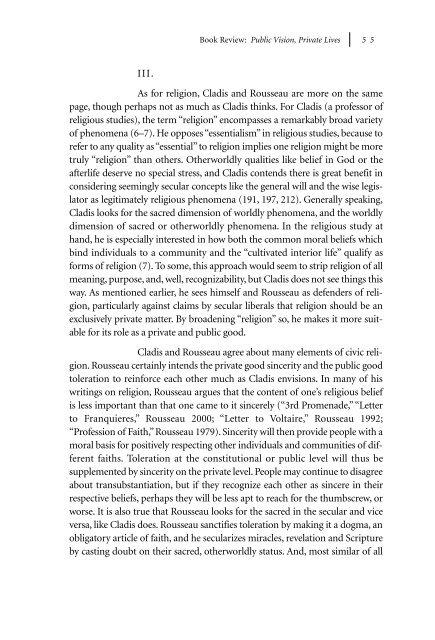Beyond Struggle and Power: Heidegger's Secret ... - Interpretation
Beyond Struggle and Power: Heidegger's Secret ... - Interpretation
Beyond Struggle and Power: Heidegger's Secret ... - Interpretation
Create successful ePaper yourself
Turn your PDF publications into a flip-book with our unique Google optimized e-Paper software.
Book Review: Public Vision, Private Lives<br />
5 5<br />
III.<br />
As for religion, Cladis <strong>and</strong> Rousseau are more on the same<br />
page, though perhaps not as much as Cladis thinks. For Cladis (a professor of<br />
religious studies), the term “religion” encompasses a remarkably broad variety<br />
of phenomena (6–7). He opposes “essentialism” in religious studies, because to<br />
refer to any quality as “essential” to religion implies one religion might be more<br />
truly “religion” than others. Otherworldly qualities like belief in God or the<br />
afterlife deserve no special stress, <strong>and</strong> Cladis contends there is great benefit in<br />
considering seemingly secular concepts like the general will <strong>and</strong> the wise legislator<br />
as legitimately religious phenomena (191, 197, 212). Generally speaking,<br />
Cladis looks for the sacred dimension of worldly phenomena, <strong>and</strong> the worldly<br />
dimension of sacred or otherworldly phenomena. In the religious study at<br />
h<strong>and</strong>, he is especially interested in how both the common moral beliefs which<br />
bind individuals to a community <strong>and</strong> the “cultivated interior life” qualify as<br />
forms of religion (7). To some, this approach would seem to strip religion of all<br />
meaning, purpose, <strong>and</strong>, well, recognizability, but Cladis does not see things this<br />
way. As mentioned earlier, he sees himself <strong>and</strong> Rousseau as defenders of religion,<br />
particularly against claims by secular liberals that religion should be an<br />
exclusively private matter. By broadening “religion” so, he makes it more suitable<br />
for its role as a private <strong>and</strong> public good.<br />
Cladis <strong>and</strong> Rousseau agree about many elements of civic religion.<br />
Rousseau certainly intends the private good sincerity <strong>and</strong> the public good<br />
toleration to reinforce each other much as Cladis envisions. In many of his<br />
writings on religion, Rousseau argues that the content of one’s religious belief<br />
is less important than that one came to it sincerely (“3rd Promenade,” “Letter<br />
to Franquieres,” Rousseau 2000; “Letter to Voltaire,” Rousseau 1992;<br />
“Profession of Faith,” Rousseau 1979). Sincerity will then provide people with a<br />
moral basis for positively respecting other individuals <strong>and</strong> communities of different<br />
faiths. Toleration at the constitutional or public level will thus be<br />
supplemented by sincerity on the private level. People may continue to disagree<br />
about transubstantiation, but if they recognize each other as sincere in their<br />
respective beliefs, perhaps they will be less apt to reach for the thumbscrew, or<br />
worse. It is also true that Rousseau looks for the sacred in the secular <strong>and</strong> vice<br />
versa, like Cladis does. Rousseau sanctifies toleration by making it a dogma, an<br />
obligatory article of faith, <strong>and</strong> he secularizes miracles, revelation <strong>and</strong> Scripture<br />
by casting doubt on their sacred, otherworldly status. And, most similar of all
















